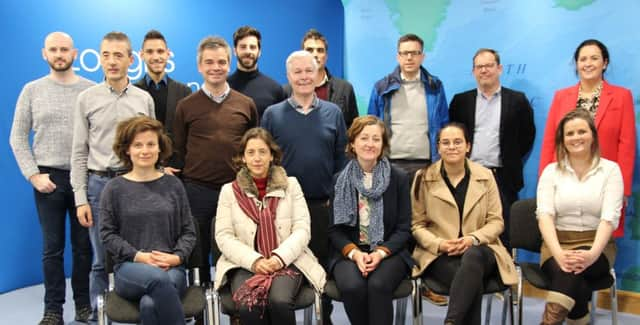First SAFER scheme is set to enhance our seafood sector


SAFER, or Smart Atlantic Seafood Clusters, is co-funded by the Interreg Atlantic Area Programme and aims to improve the performance of the seafood industry across the Atlantic area by increasing technology adoption and transnational co-operation.
Project stakeholders met in the city on May 8th and 9th for their third steering committee meeting in the Council area to present and discuss the SAFER initiative with target groups and conduct site visits to the relevant stakeholders involved in the scheme, including the Loughs Agency.
Advertisement
Hide AdAdvertisement
Hide AdJennifer O’Donnell, Tourism Manager at Derry City and Strabane District Council, explained that the specific local aim of the wider project is to sustain the native oysters in Lough Foyle and to develop their tourism potential through the hospitality sector.
“Our local waterways are one of our most important natural resources in attracting visitors to our region,” she explained.
“Council are working closely with Loughs Agency and other stakeholders in the food and drink sector locally to maximise its potential and preserve it for future generations.
“The local ambition of the SAFER project is to develop our native Lough Foyle Flat Oyster that has been identified as a Unique Selling Product for our region, developing it from both a sustainability and tourism perspective.”
Advertisement
Hide AdAdvertisement
Hide AdLeo Strawbridge Energy Manager at Derry and Strabane District Council added: “Loughs Agency and the Council are progressing two specific pilot projects through SAFER to help grow the native Oyster population in Lough Foyle through the use of cutting edge technology, the results of which will be shared with other Atlantic regions.”
The first SAFER pilot project will support the development of restoration tanks by the Loughs Agency for the native Lough Foyle Irish flat oyster to help sustain and grow their natural population.
Oyster production in the wild is dependent on many factors and these tanks will provide an optimum environment for the oysters to grow and in turn support sustainability of this important asset.
Key to this development is the monitoring and maintenance of optimal conditions of water in the tanks for oyster well-being.
Advertisement
Hide AdAdvertisement
Hide AdWireless sensors will enable officers to monitor conditions such as water oxygen levels, chlorophyll and temperature several times a day.
To avoid the need for manual testing and measurement which would require several visits a day by staff to remote and difficult to access terrain, a system will allow data to be sent back to a remote database which can be accessed from anywhere by staff.
The second pilot further supports the sustainability of the Lough Foyle Irish flat oyster by creating an electronic tagging system.
Currently Lough Foyle oyster fishermen are issued with pre-authorisation plastic tags which are affixed to bags, a system that has been vulnerable to abuse and error.
Advertisement
Hide AdAdvertisement
Hide AdThis pilot will replace the existing system with an electronic tagging system, which allows enforcement officers to scan and read each tagged bag upon landing.
These pilots will provide critical support to the Loughs Agency in ensuring the sustainability of the native Lough Foyle flat oyster.
This is coupled with a new video which will communicate just how special and unique the oyster is to the consumer.
Results and recommendations resulting from the assessment of pilots will be presented to other Atlantic Area regions to help extend the network and maximise the project’s results.
SAFER is funded by the European Regional Development Fund (ERDF) through the INTERREG Atlantic Area Programme with a budget of 1.8 million euros